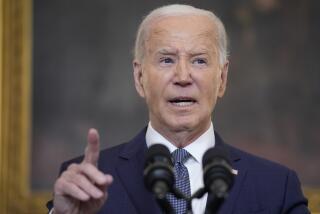PLO to Limit Attacks, Arafat Says
- Share via
CAIRO — Palestine Liberation Organization Chairman Yasser Arafat, under heavy pressure from Jordan and Egypt to prove his commitment to the peace process, pledged Thursday to suspend all PLO military operations outside of Israel and not to attack civilians inside the Jewish state.
However, Arafat stopped short of renouncing all forms of violence against Israel and appeared to introduce a note of ambiguity by also declaring that the PLO “reiterates the right of the Palestinian people to fight against Israeli occupation in all possible ways.”
The wording of the pledge, whose significance Arafat sought to enhance by naming it “the Cairo Declaration,” was worked out in two days of talks with Egyptian President Hosni Mubarak.
Israel immediately dismissed the declaration as meaningless. Foreign Ministry spokesman Avi Pazner said, according to a report from Tel Aviv, that the statement represents “no change at all” in the PLO’s position, since Arafat has never acknowledged employing violence outside the Israeli-occupied territories.
“Arafat does what he does best--playing with words, while his deeds continue to speak for themselves,” Pazner was quoted as saying.
Mubarak at His Side
With Mubarak standing at his side, Arafat told reporters that the PLO “denounces and condemns all terrorist acts, whether those by countries, or by persons or groups, against unarmed civilians in any place.”
In a veiled reference to the hijacking of the Italian cruise liner Achille Lauro and the killing of an elderly American passenger, Arafat noted that recent “incidents” have had “adverse effects on the Palestinian people’s cause.” But he said the PLO “condemns all outside operations and all forms of terrorism and repeats once more the commitment of all its institutions and factions to this decision.”
Officials said the key lines in Arafat’s pledge were the condemnation of “all outside operations”--meaning outside Israel--and of attacks against civilians “in any place,” including Israel.
Ahmed Abdel-Rahman, Arafat’s chief spokesman, said this means that all attacks against Israelis or Israeli interests outside of Israel will be banned and that no operations will be undertaken against civilians in Israel or in the occupied West Bank and Gaza Strip.
“The PLO,” Arafat added, “as of today will take all punitive measures against violators” of this pledge.
This was clearly a reference to the Palestinian hijacking of the Achille Lauro in waters off Egypt Oct. 7. The hijackers, members of a small PLO faction, murdered American Leon Klinghoffer, 69, before surrendering to PLO negotiators two days later.
Senior PLO officials, denying that the hijacking was an authorized operation, have said that the four Palestinians were on their way to Israel to retaliate for the Israeli bombing of the PLO’s Tunis headquarters Oct. 1 that killed 72 people. Then, when they were discovered by a crew member, the hijackers panicked and seized the ship, PLO officials said.
The PLO officials called the hijacking a “terrible mistake” and a “disaster for the PLO,” which had been trying to project a more moderate image in order to overcome U.S. and Israeli objections to its participation in Mideast peace talks.
The Achille Lauro incident and its aftermath also severely strained the PLO’s relations with Egypt and Jordan, which have pressured Arafat to make amends by issuing a declaration renouncing violence--one of the conditions that the United States has said Arafat must fulfill before Washington will talk to the PLO.
Although the Cairo Declaration fell short of a complete renunciation of violence, it did appear to go a step beyond the PLO’s previously declared policy, which renounced international acts of terrorism but held open the option of attacking Israeli agents outside of Israel and did not explicitly rule out attacks against civilian targets inside Israel.
Denounced ‘Acts of Terrorism’
In the past, the PLO has sought to draw a public distinction between “acts of terrorism,” which it has denounced, and “military operations that are part of the ongoing secret war between Israeli and PLO agents,” Abdel-Rahman said.
The significance of the Cairo Declaration, he said, is that the PLO has decided not to wage this “secret war” outside of Israel. However, Abdel-Rahman also said the PLO still reserves the right to attack military targets inside Israel as part of what it considers legitimate resistance to foreign occupation.
Abdel-Rahman added that the pledge made public in Cairo was also given earlier to Jordan’s King Hussein, with whom Arafat signed an accord last February to jointly seek peace talks with Israel through the United States. That accord has come under severe strains after the Achille Lauro hijacking.
“We told Hussein and we are telling the Egyptians that there will be no foreign military operations (by the PLO) against any nationalities at all. Furthermore, we have given orders not to hit civilians in Israel, but only military targets,” Abdel-Rahman said.
Angered by the Achille Lauro affair and other events undermining the PLO’s credibility as a peace partner, Hussein held what was reported to have been a chilly meeting with Arafat in Amman last week.
Hussein did not dissolve the February accord, as some reports said he threatened to do. But the strains between Jordan and the PLO remain visible as evidenced by the fact that Hussein now appears to have offered a major concession in the joint Jordanian-Palestinian peace proposals without first consulting Arafat.
Four-Stage Peace Plan
According to Jacques Poos, the foreign minister of Luxembourg, Hussein outlined a four-stage peace plan to him during a visit to Luxembourg on Tuesday that would keep the PLO from formally participating in the peace process until it “explicitly” recognizes Israel’s right to exist.
Poos said that the plan, as outlined by Hussein, would begin with a meeting between U.S. and Jordanian officials and would be followed, in the second stage, by “explicit recognition” of Israel by the PLO.
The third stage would involve a meeting between the United States and a Jordanian-Palestinian delegation at a peace conference sponsored by the United Nations.
This, in turn, would set the stage for the fourth and final step--direct negotiations among Israel, Jordan and the Palestinians, Poos said.
This scenario, which caught PLO officials here by surprise, differs from the Jordanian-PLO peace plan in two key respects. Previously, Jordan and the PLO had insisted that the United States meet with the joint Jordanian-Palestinian delegation as a first step, after which the PLO would recognize Israel’s right to exist in exchange for U.S. acceptance of the PLO’s right to bargain for the Palestinians at the peace table.
The previous proposal also insisted that the final step in the peace process be an international conference, alongside of which the direct talks favored by Israel and the United States could take place.
In Amman, a senior Jordanian official confirmed that Poos had correctly outlined the plan as explained by Hussein, but denied that there was anything new in it. “It is what we have been saying all along,” the official said.
More to Read
Sign up for Essential California
The most important California stories and recommendations in your inbox every morning.
You may occasionally receive promotional content from the Los Angeles Times.













